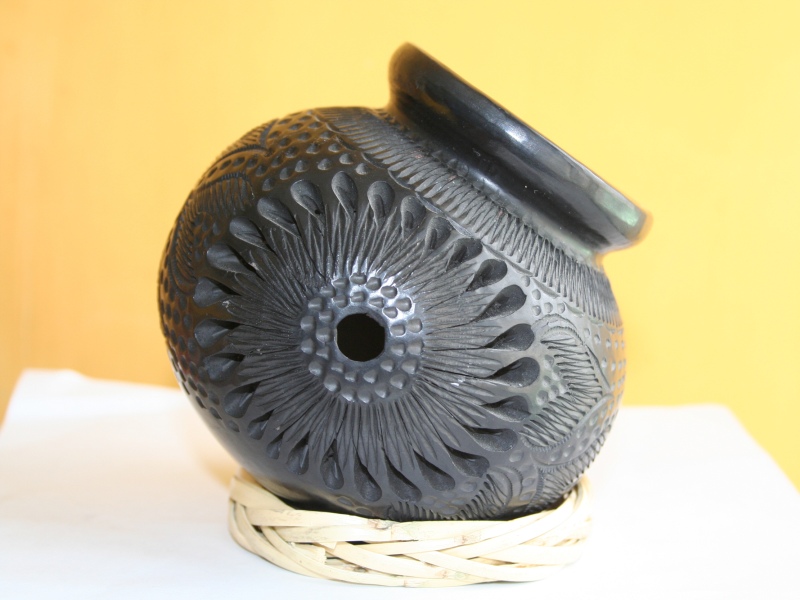
Black clay de Oaxaca (Photo: Claudia Martínez)
Sometimes you have to go far away from home before you can understand why what you have may be too much.
Several years ago, I went to Mexico for ten days. It was safe to travel there then, and it’s a good thing it was—I was a single woman traveling alone, and at one point I found myself on a six-hour trek through the Sierra Madre mountains, from Oaxaca to Mexico City, on a second-class bus (yes, that’s what they called it) that took the mountain roads at such breakneck speeds, at times we came perilously close to tumbling right off the edge of the world and into the rocky ravine below. I remember thinking, This is it . . . I am going to die in the bowels of Mexico, and no one will ever know . . . but that’s a whole other story.
The point is, I was deep in the heart of Mexico—a foreign country with some parts so remote and poor, you have to wonder how people can even live there.
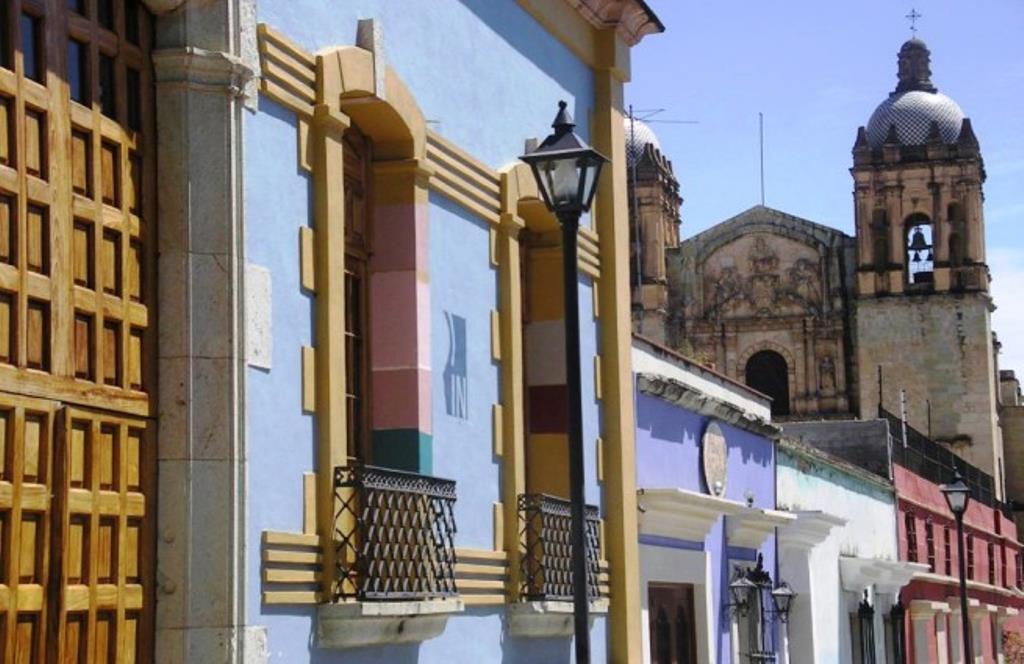
Street in the colonial city of Oaxaca de Juárez (Photo: Jay Holliday)
Oaxaca de Juárez, simply called Oaxaca, is a sleepy town nestled quietly in the foothills of the Sierra Madre del Sur. It is the capital of the State of Oaxaca, which borders the Pacific at the far southwest corner of Mexico. The city of Oaxaca, a six-hour mountainous drive inland from the coast, was my primary destination and about as far away from home as I had ever been before in terms of distance, economics, and culture.
Oaxaca has deep Zapotec roots. Its history predates the Spanish Conquest of the Aztec Empire in 1521 by hundreds of years. Sitting high atop a mountain overlooking the city are the ruins of the ancient Zapotec capital, Monte Albán. For someone like me, who loves anything archaeological, it was a must-see.
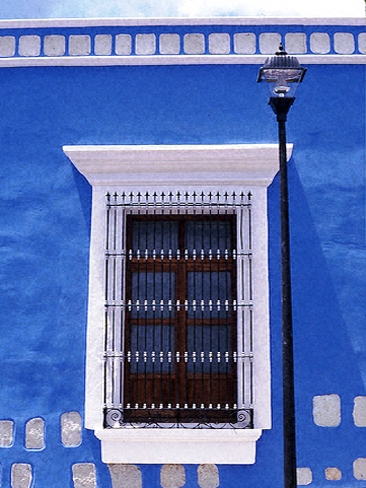
Window in Oaxaca
The city itself was charming. Cobblestone streets in the Centro Histórico district were gas lit and lined with Spanish colonial architecture in soft pastels and bright colors. Buildings had tall windows with wrought-iron gates or balconies. Fragrant bougainvillea spilled out over courtyard walls adding more splashes of vibrant color. Quaint little shops—selling barro negro pottery, alebrije figures, woven blankets, and painted metalwork—dotted the map. On every street corner was an historical church; and the 16th century church of Santo Domingo de Guzmán, with its gilded Baroque interior, was simply magnificent.
Most alluring was the lovely, tree-shaded Zócalo at the center of the city with its Victorian lacework gazebo, fountains, and pathways. Everyone gathered there—musicians, artisans, tourists, balloon vendors, native Zapotec and Mixtec selling their wares, Triqui women weaving blankets, and street children playing ball or peddling pencils and Chicklets for pennies. Best view of the scene was from the second-floor balcony of La Casa de la Abuela, a restaurant serving authentic Oaxacan food, including mole negro tamales, traditional caldo de gato (beef soup with vegetables and local corn), and roasted grasshopper. By nightfall, the square was ethereal under the gas lights and lively as a block party with marimba bands playing, Mezcal flowing, and the whole of Oaxaca invited.
It was easy to fall into the rhythm of the city. The people were warm, friendly, and helpful. The food was delicious. The climate was subtropical. The pace was slow. Oaxaca felt almost surreal and far-removed from mainstream Mexico . . . more authentic, more Indian, richer in history and culture. I felt at home there and at peace.
Returning to the USA, I experienced reverse culture shock. Almost immediately, I was not only keenly aware of the economic and other differences that were plainly obvious the minute I landed in Houston; but I was also rather appalled by what I perceived to be an almost obscene excess in American culture and, most specifically, in my own life.
My house, my yard, and all the other stuff I owned suddenly seemed to be way too much, too extravagant, and totally unnecessary for a single woman living alone. I didn’t need a big house with a full basement, three full baths, and rooms full of furniture. I didn’t need an acre of lawn to mow. I certainly didn’t need to work all week—with no time or energy for much else—just so I could afford a house that took me all weekend to clean. Where, I ask you, is the joy in that?
Our society measures success by the jobs we have, the amount of money we make, and the things we can buy with that money. To impress others and boost our own egos, we surround ourselves with stuff—big houses, new cars, cellphones, multiple TVs in multiple rooms, expensive toys, and gadgets galore. Many times, we can’t afford any of it comfortably—the houses are mortgaged, the cars are leased, and everything else is bought with revolving credit that never goes away. We live paycheck-to-paycheck just so we can hang on to the lifestyle we feel entitled to live . . . or we live above our means just to emulate a lifestyle we want . . . and in the process, we lose our grasp on what is truly important.
The things I owned were not enhancing the quality of my life.
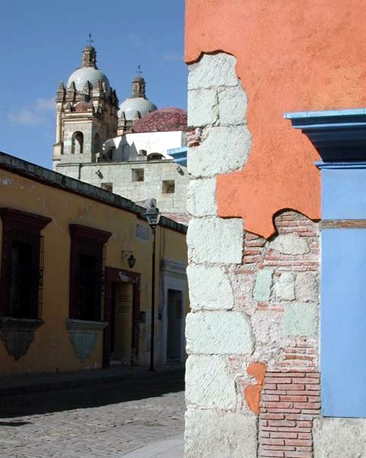
Street corner near Santo Domingo
Oaxaca is one of the poorest states in Mexico. Indigenous people make up a large part of its population. Many of them are socially marginalized, living in extreme poverty in and around the city. It’s not unusual for whole families—parents and their adult children with spouses and children of their own—to share a house the size of my living room. On the way to the ruins at Monte Albán, I saw ramshackle corrugated metal boxes clustered together on hillsides—the Oaxacan equivalent of American suburbia. Vendors on bicycles rode through town in the early-morning hours selling plastic jugs of safe drinking water. Men swept the city streets with straw brooms. Beggars were a common sight on church steps. Street children worked in the Zócalo in order to survive or help their families. My own up-close-and-personal experience came when a Triqui mother of five tearfully praised the heavens above and blessed me for giving her $20 for a $2 blanket. I was told that $20 was more money than she could hope to make in a month.
These things affected me deeply. In sharp contrast, I was living well, surpassing my basic needs, spending too much on my house and wasting precious time, energy, and freedom trying to maintain it. This is not to say I wanted to give up creature comforts and embrace a life of poverty; but I knew, for starters, that I would be perfectly content living in a little house with nothing better to do on weekends than tend my flower garden.
Life in Oaxaca had been simple and uncomplicated. I had been happy there . . . living in the moment . . . less concerned with where or how I lived than with the quality of my days. I crammed as much as I could into every one of them. I made each day matter. I wanted to feel the excitement and joy that come when you experience new things. I was living life to the fullest.
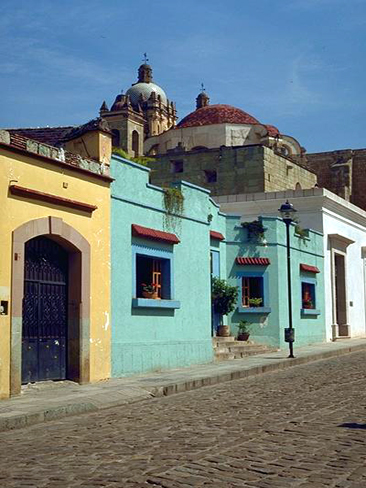 It’s not so much the memories; but, rather, the feelings the memories invoke.
It’s not so much the memories; but, rather, the feelings the memories invoke.Granted, I had been on vacation. Vacations have a way of suspending reality, and in the warm glow of nostalgia, memory is oftentimes selective.
Still, what I remember most is the profound joy and peace I found in that foreign place. My trip had been a learning experience. It put things into perspective and showed me what mattered most.
On the Zócalo in Oaxaca, I had laughed out loud and played ball with the street children. Friends, who saw the photo of me taken that night, said I never looked happier.
Similar posts you might like
For some time now I’ve been walking around with three words at the top of m...
Oh, how easy it would be if all you had to do to simplify your life was eli...
Traveling is all about getting away from it all, exploring new and exciting...
Traveling doesn't have to be stressful and won't be if you learn to travel ...


Beautiful post! Yes, it is so transformative to witness poverty in other countries and to realize how blessed we truly are. Thanks for sharing! It’s very timely too, because I’m headed to Huatulco, in Oaxaca state later this week. Best, Irene
Huatulco! How exciting! Have a great time!
Patricia, you painted such a lovely picture of Oaxaca you make me want to visit there. I live in small house in a tiny country and still have too much stuff. Just sticking to the bare necessity is the best way to live.
I would be content to have just what I need. I’m trying to simplify, but I’m not quite there.
Patricia, Oaxaca is on my bucket list (during Dia de los Muertos) so I appreciated you sharing your experience. I had the same experience coming home from El Salvador in 1988… and I immediately began downsizing. Did you? Just curious what kind of long-term impact your trip and revelation had. We still have too much stuff…
I began downsizing immediately, eventually sold my house and bought a smaller one, and am on a constant quest to simplify. It takes times, it takes practice. I, too, still have too much stuff.
Sadly I could barely do the math to get this comment posted. Never my forte. Patricia I loved this piece. It evoked a place beyond time. I’ve been to Mexico several times as a Southern California native and have always noticed how revved up I am when I get there and then notice again how annoyingly fast-paced my life feels when I come back. There really is no other place like Mexico where the clock stops and senses are engaged. I miss it. I’ve been nervous to take my own children there due to the recent spate of kidnappings and regret they won’t have the early memories I have of sitting on the roadside watching a snake digest a large rat, eating a raw oyster shucked right off a boat coming in from the ocean, andando vueltos (crusing) in the back of a pick-up truck over the four street hub of Carborca in the state of Sonora. I do miss Mexico. Thank you for reminding me of the reasons why.
Sorry about the math, but it is the ONLY thing that keeps my comments 100% spam free. I’m glad you were able to get through. I love your comment. “…where the clock stops and senses are engaged…” Yes, that’s it exactly! And your early memories evoked more of my own. Thanks for sharing.
What a beautiful lesson to learn early in life. Our life is not the things we own, but the people we touch. If I spend my whole life working for things, and then taking care of those things, did I really live much of a life? My husband and I are choosing to move from this large home with its large yard to something more manageable for the two of us. We don’t want to spend all of our time maintaining a house anymore. Life is too short for that. And I love Mexico. Or at least I used to. I haven’t been in a long time. It is amazing how safe I felt there.
My life changed dramatically after my trip. Things I thought were so important, like having a big beautiful house, suddenly weren’t important at all. Downsizing and simplifying made sense. That’s why I say “live simply . . . simply live well. “
We have learned just like you, if you are traveling abroad, honor and enjoy the resident culture. Don’t judge. Embrace their way of life and you will experience an amazing trip.
Embracing the culture, especially when it’s so different from your own, is the only way to go. One of my fondest memories is eating shucked corn hot off the grill at an open air market outside of town. It was their version of fast food, and it was delicious.
Lovely post Patricia. Like you, my parents absolutely adore Mexico. They have spent two months there every year for the past few years. To them, it is exactly as you describe. They’ve been to so many places in the world, and Mexico is the place they love the best, warnings of danger or not. They don’t see it. They only see the friendly people, the beauty in nature, the focus on art and music, and a real sense of family. It sounds like a wonderful place.
How wonderful that your parents can spend two months a year in Mexico. I totally understand why they would be charmed by the country and its people. I would go back if it wasn’t so dangerous. But sometimes I wonder if a second trip would be disappointing, somehow different from what I remember so fondly.
Good for you for capturing the mood and beauty of the area so fully, and for allowing it to bring you into a richer and fuller way of living. Sometimes I think for many people, it’s not that they have stuff, it’s that stuff has THEM. They spend their days and nights working to pay for and maintain these things that don’t bring them joy anymore.
They say you should be grateful for what you have and stop wanting more. Unfortunately, it’s easy to get caught up this age of abundance. I’m on a constant quest to simplify simplify simplify. It’s not always so easy.
I live in San Diego, have traveled all around the world and have still not gotten to Mexico! Reading your post makes me feel like I’ve been there — so beautifully written. I agree that seeing the way other people live — and how much less many of them live with — makes you re-think your priorities, and is why travel is so important. Thanks for the reminder.
Travel is the best education. Who said that? So true. Did you know Europeans consider Mexico to be a third-world world? I never thought of it that way until I traveled through the mountains to Oaxaca City.
This is the kind of experience that changes your view of the life you live forever. Many of us were raised very simply and we understand what that life is like on some levels. You are right. It is a shock when we come home. Too much stuff, too much food, too much of everything. We are gorging on our own affluence. b+
Life was much simpler when I was growing up. We weren’t poor, but we weren’t “gorging on our own affluence.” Love that phrase . . . it says it all!
This is such a beautiful post. My father-in-law’s second wife (a few years older than me) spent a year of college in Oaxaca and has returned many times. The family she lived with became her second family for life. I will share your post with her. Loved reading your description.
It’s always gratifying to hear that I’m not the only one who “knows” about Oaxaca. Spending a year there would be easy to do.
Patricia, you’ve captured so many of my own feelings here. As I grow older, I have begun to divest myself of so many of the things that once seemed so important to own…and to try to take more pleasure in the things that make life genuinely rich. You’re so lucky to have made this journey, and it was a pleasure reading about it.
Thanks, Karen, it was a pleasure to write about it. The trip was my “aha” moment.
So now I am curious – did you sell your house and downsize?
Yes. I sold my house, met Tom, and we bought a little house on a lake . . . not necessarily in that order.
Love your 11 Helpful Tips for Travelers. Forty years later, they still apply!
I love Mexico – the people are friendly, the weather is beautiful, and it’s so relaxing. Of course I’ve never traveled as far into the country as you did – but I would like to someday.
It’s definitely worth a visit. Great museums and cathedrals . . . Benito Juarez Market . . . Monte Albán . . . the ancient tree in Mitla with a trunk span of over 40 feet. I loved it all. I may never go back, but I certainly will never forget it.
Thank you for taking me with you to this region of Mexico. Your photos are so well composed and interesting. I had a similar culture shock returning from six months of travel in Israel. My So. Cal. life seemed completely frivolous. It’s good to get outside of the “water we swim in” from time to time so that we can get a little perspective.
I agree. It is good to leave your comfort zone. I never thought my trip to Mexico would be life-changing, but it was. It really put things into perspective.
I agree with Georgia, you truly should think about making a career as a travel writer, and another thing – I kinda envy you for visiting Mexico – a dream of mine from a long time … Eh, one day maybe.
You are an intense writer. Have you considered travel writing? I think you should send this to some major newspapers/magazines as a freelance writer. Beautiful job!
Beautifully expressed and so true.